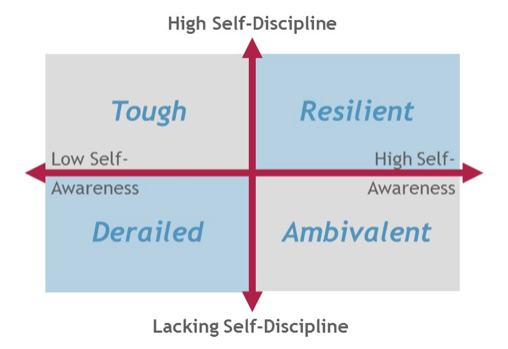Coach, what is thy color?
Why should anyone be coached by you?
A couple of weeks ago, I was on my way to a prestigious leadership symposium of a large car manufacturer. For the following two days, I was supposed to be one of the experts facilitating workshops for the 80 or so participating managers. The topic of my workshop was called “Resilience and Leadership” and I was very much looking forward to it. I had just completed the manuscript of my new book called “The Art of Self Leadership”. It was my 8th book on the topic and I really think of myself as an expert when it comes to dealing with adversity and hardships – at least in theory. As it was early February there had been a very cold period with snow and ice in the past days. However, this very morning sudden rain had turned the stairs in front of my house into an ice rink and despite the warning of my wife the blessings of gravity hit me by surprise and I fell hard on my back. The pain was remarkable but I quickly got back on my feet and since I was running late I somehow got my luggage and myself into the car and drove to the venue of the event without much further ado. At this moment, I was not thinking very much. There was only one voice in my head saying “You have to get there somehow and you must not be late”. I don’t recall exactly how I got out of the car since I could barely walk. When I arrived at the conference the organizers looked at me with deep concern in their faces indicating that I looked exactly as bad as I felt.
Voices in My Mind
They asked me if I wanted to cancel the workshops. I briefly considered it but it just did not feel right. From a previous experience, I knew that a bruised rib is a painful but relatively hazard-free medical condition. However, I was also aware that a broken rib feels exactly the same but with a substantially higher degree of risk associated with it, due to possible punctures of your intestines. Not a very funny thought. I recall that I heard two voices in my head. Number one felt like it was coming from an older part of my brain as it was very loud and was going something like:
Don’t be a wimp. You can’t let the client down!
They will hate you and will certainly not come back to you!
However, there was also another, yet much weaker voice which was probably coming from a more rational part of my neocortex. I was mumbling something like:
You are a flipping resilience expert. You have to be a role model for showing
your boundaries. Don’t repeat your past mistakes!
Needless to say, that I delivered the workshop of the first day with the help of a lot of painkillers and my usual endurance. Somehow, I survived it but I really felt that the participants had only gotten about 50% of my normal performance. However, in contrast to say 10 years ago, I did not feel guilty for that. I had given it my best. Also, I had made it transparent to the managers that there had been an accident and that I might have to stop the workshop should my condition go south. Nevertheless, I felt somehow stupid for toughing it out.
Being Resilient Sometimes Feel Stupid
[nbsp]In our workshops on resilient leadership my colleagues and I talk about the difference of being resilient as opposed to being just tough. The difference here is self-awareness. When you are just disciplined without listening to your own needs this makes you tough. This applies to many managers we work with including my former self. The problem with exclusively focusing on toughness and denying your vulnerability is that at one fine day something will come, which is tougher than you are. And then this hits you by surprise and you have very likely no strategies ready to cope with this insult. In contrast, being self-aware means listening to your own needs and accepting your own vulnerability. However, you are still on your own when making the decision if you are to go on or not. This is what we call “ambivalence”. And while both options may not feel great, at least you are making a conscious decision as opposed to just acting out some unconscious drivers - like “I will be rejected if I don’t show everybody how committed I am!” - which date way back to your childhood days.

It ain’t over til It’s over
In the morning of the next day I felt much better. The pain was ok and also my mirror image resembled more the memory of my own face on a good day. Also, the workshop this time went much smoother with great participant interaction and good feedback. I was grateful and felt a great degree of relief. Everything was geared up for a happy end and I was sure this would be a nice story on resilience to tell in my workshops to come. But, it ain’t over til it’s over, they say. So, I travelled on to the next town and the next hotel to run yet another workshop on resilience the next day. What an irony! I still felt as if I had been run over by a truck. And then things turned really sour. In the middle of the night I woke up with the most intense pain in my back and my chest. Luckily, I had never encountered anything as painful as that before. This time there was no doubt that it was a bit more serious. One hour later I was hospitalized and my x-ray showed a nice fracture in my ribs. I had to cancel the workshop and this time I did not feel any ambiguity. There were no more two voices in my head trying to influence my actions. The only voice I heard was my own screaming “uhhhh” and “arggghh” whenever I did a wrong move or just took a breath a tiny bit too deep. In a weird way, the strong physical pain was a relief for my decision process with regards to going on or giving in. It basically relieved me from the decision. I had to stay another three days in hospital until the medication and my body started to jive and I could walk straight again. A lot of quality time for reflection.
What have I learned?
So, what did I learn from all of this? Well, listening more to my wife, who had told me about the icy stairs, would be a good starting point. I am sure that she would agree. Other than that, I probably would do pretty much the same thing if I was in the same situation again. Yes, I could have cancelled the workshops but I would not feel better then. I have learned that you can behave in a resilient way, i.e. listening to your own needs and reflecting your unconscious drivers, and still feel stupid and guilty at the same time. Often in these situations there is no easy way out. What I would do differently though would be this: I would ask myself the question: “Are you prepared to live with the consequences of your decision?” This might help me next time to feeling a bit more comfortable in my own skin when trying to be mindful of my vulnerability. But in hint side I think it is more likely that I have to get used to the clumsy feeling which results from not doing what people are expecting from you.

Karsten is passionate about getting to the core of things in leadership coaching. His clients often describe him as an intuitive, empathic and at times challenging sparring partner who asks the right questions.
He helps his clients to look at issues from a different angle to reach their goals.
Karsten has an extensive international business and leadership background gained over 16 years.
He held leading positions at Accenture, Bombardier Transportation and Dell. In his last position as Managing Director for DELL's consulting business, he built up the field of business consulting in Europe.
Karsten is a Leadership Coach since 2006. He is accredited by the European Mentoring and Coaching Council (EMCC)and the World Economic Forum. He published several articles and books on the topics leadership, coaching and resilience. Furthermore, he is a certified psychotherapist (naturopath) and works as faculty at the Center for Responsible Leadership at WHU business school in Koblenz.

Did you know that by far the largest program to enhance resilience has been launched by the US Army...
Leave a Comment